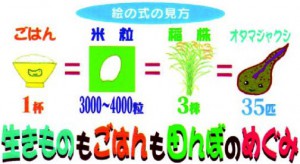Yutaka Une, farmer and philosopher
Before we knew it, we have begun to think that it is always better to manufacture something with lower costs and shorter working hours if quality is not affected. But I believe such way of thinking is abnormal when it comes to agriculture.
If farmers become obsessed with such an idea, it would become a norm for them to try to remain competitive at home and abroad only in terms of economic value.
However, it is not only farmers that are engaged in farming. For example, rice is created by the coordination among the sun, the rain, water, soil, other creatures, wind (atmosphere), waterways, ridges between rice fields and rice plants themselves in addition to farmers’ work. We call it the community of all sentient beings.
Now is the time to change the sense of values
Under the capitalist economy, such things that do not lead to money have been exploited and damaged, with those doing so not even being aware of it.
Seiichi Tobata, who led the nation in modernizing Japan’s agriculture from the early Showa era to the postwar period, said when he was a professor of the University of Tokyo that agricultural policymakers and academics have the mission of not letting Japan’s agriculture fail to catch up with the development of capitalism. This idea has become the mainstream of agricultural policymaking and academic research, which leads to the Trans-Pacific Partnership agreement of today.
Meanwhile, Kozaburo Tachibana, who advocated physiocrasy during the same period, argued that agriculture should not be conformed to capitalism because it is dealing with nature.
The physiocratic theory was ostracized after the World War II, but today we know that advocates of physiocracy have understood the essence of agriculture far more deeply.
 We must again seriously work on expressing as an ideology why agriculture should not be conformed to capitalism. Unlike in the past, we are not confronting capitalists but capitalistic ideas rooted in the hearts of the Japanese people and farmers.
We must again seriously work on expressing as an ideology why agriculture should not be conformed to capitalism. Unlike in the past, we are not confronting capitalists but capitalistic ideas rooted in the hearts of the Japanese people and farmers.
We should be making efforts to shift our views on agriculture out from the capitalist framework. I would like to show an example.
More than 200,000 celluloid sheets laid under writing paper, with illustrations of rice and creatures grown in rice paddies, have been sold by the Farm and Nature Research Center by the fall of 2015.
One illustration shows that a bowl of rice is equivalent to three rice plants, and that 35 tadpoles live around the plants. This illustration contributes to drastically changing people’s views about agriculture, because it describes the fact that we have to eat rice in order to let creatures in rice paddies survive. Rice plants and tadpoles live together. They are the members of the community of sentient beings.
Humans are not the center of food production
The thought that foods exist only for humans overlooks the significance of agriculture. Agriculture produces the world of sentient beings without recompense. In such a world, the logic of productivity centered on capitalistic-minded humans does not hold true.
<Profile> Born in Nagasaki Prefecture in 1950, Yutaka Une has advocated low-chemical farming methods since 1978 when he was working as an agricultural extension officer. He cofounded a nonprofit organization the Farm and Nature Research Center.
(Jan. 18, 2016)

